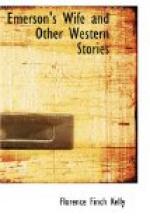The only reminder of those towering granite Preachers, with their everlasting “All is vanity,” was the roaring and crashing of the Yosemite Falls, which filled the Valley with their thunder and made the air tremble.
The sights, the sounds, the odors, enveloped my senses and filled me with delighted, languorous content. It was very comforting, and I sat down on a log in the edge of a little opening, all pink and fragrant with wild roses, to enjoy the sensuous delight of it all and so take revenge upon the great stone Preachers waiting for me outside the thicket.
Presently there came from beyond the glade a soft, crooning noise, which in an instant more became that sweetest of sounds, the voice of a happy child alone with nature.
A little girl, perhaps four or five years old, came slowly down the path. She was talking to herself and to the trees and birds and squirrels, and even to the brown pine-needles under her feet. Her hat, which she had stuck full of wild roses, hung at the back of her head, the ends of her brown curls just peeping below it. Without the least trace of childish shyness she came straight to where I sat, mounted the log beside me, and asked me to take a thorn from her finger.
“Did it hurt you?” I asked, as I patted the chubby brown fist after the operation. “You are a very brave little girl not to cry.”
“Yes, I know it,” she replied, looking at me with big violet eyes, frank and confiding. She was a beautiful child, with a glorious perfection of feature and complexion. “I ’m always brave. My papa says so, and my new mamma says so, too. I ’ve got two mammas—my new mamma and my gone-away mamma. But I like my new mamma best.”
“Do you? Why?”
“’Cause she’s always and always dust as good as she can be. And she never and never says ‘Stop this minute!’ er ’at I make her head ache, er ’at I ’m naughty, er anything. She dust puts her arms all ’round me and says, ‘Dear little girl.’ An’ ’en I ’m good. And I love my new mamma, I do, better than my gone-away mamma.” And she gave a decided little nod, as if in defiance of some privately urged claim.
“Where has your other mamma gone?” I asked, expecting to hear but the one answer. She raised her long lashes and looked at me seriously.
“You ’re a tourist lady, ain’t you? That’s why you don’t know. Well, it was a tourist man, ’at stayed a long time, who tooked my gone-away mamma away.”
“A tourist man? Why did he do that?”
“’Cause he did n’t want me ’round, I guess. When the flowers was here that other time he comed to the store where my mamma sold all the pretty things my papa made dust every day an’ every day. An’ I did n’t like him a bit, I did n’t.”
“Why didn’t you like him?”
“’Cause he did n’t like me, and did n’t want me ’round. When my mamma was there and I was there, he would come and talk to my mamma, an’ ’en he would tell her to send me away. An’ ’en she would put me in the back room; an’ if I cried an’ kicked the door, she would put me in the closet. If the tourist man wasn’t there, she loved me most all the time.”




